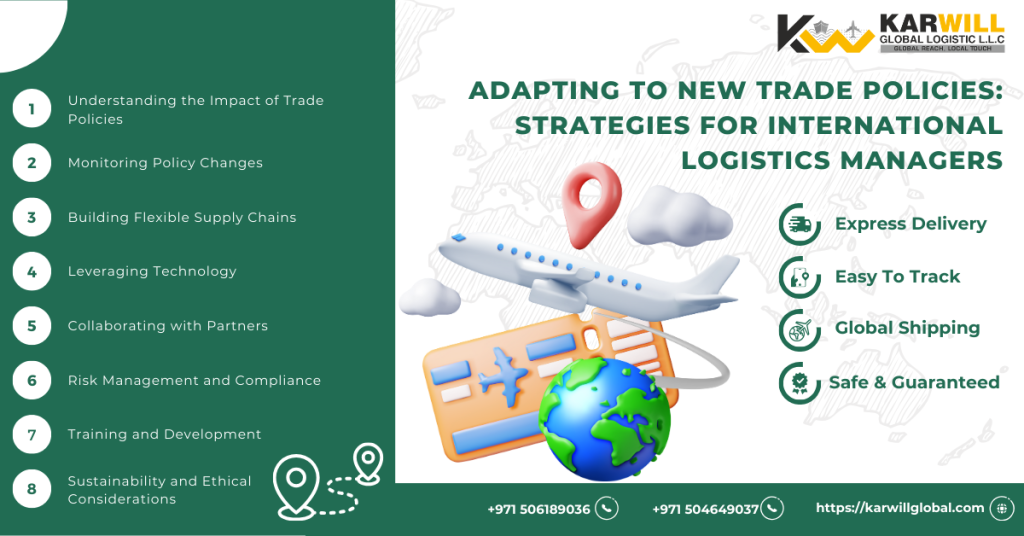
“Future-Proof Your Logistics: Thrive Amid Changing Trade Policies!”
The global trade landscape is continually evolving, influenced by shifts in political climates, economic strategies, and international relations. For international logistics managers, adapting to new trade policies is crucial for maintaining smooth and efficient operations. This blog explores practical strategies to navigate these changes effectively.
Understanding the Impact of Trade Policies
Trade policies encompass regulations, tariffs, quotas, and trade agreements that govern international trade. Changes in these policies can significantly impact logistics operations, affecting costs, delivery times, and overall supply chain efficiency. Understanding the implications of new trade policies is the first step in adapting to them.
Monitoring Policy Changes
Staying informed about policy changes is vital. Logistics managers should:
- Subscribe to Industry News: Regularly read trade publications, news websites, and government bulletins.
- Join Trade Associations: These organizations often provide timely updates and analysis on trade policies.
- Utilize Digital Tools: Leverage apps and platforms that offer real-time updates on trade regulations and tariffs.
Building Flexible Supply Chains
Flexibility in the supply chain can mitigate the impact of sudden policy changes. Consider the following strategies:
- Diversify Suppliers: Relying on multiple suppliers from different regions can reduce dependency on any single country, minimizing the risk posed by policy changes.
- Maintain Buffer Stock: Holding additional inventory can cushion the impact of delays or increased costs due to new tariffs.
- Flexible Contracts: Negotiate contracts that allow for adjustments in response to policy changes, such as variable pricing or alternative delivery routes.
Leveraging Technology
Technology plays a crucial role in adapting to new trade policies. Implementing the following technologies can enhance adaptability:
- Advanced Analytics: Use data analytics to predict the impact of policy changes and make informed decisions.
- Supply Chain Management Software: Modern SCM software can provide real-time visibility into the supply chain, helping managers to quickly adjust operations.
- Blockchain: Blockchain technology ensures transparency and traceability in the supply chain, making it easier to comply with new regulations.
Collaborating with Partners
Effective collaboration with supply chain partners can improve resilience to policy changes. Strategies include:
- Open Communication: Maintain regular communication with suppliers, customers, and logistics providers to share information and coordinate responses to policy changes.
- Joint Strategies: Develop joint contingency plans with partners to address potential disruptions.
- Leverage Expertise: Work with customs brokers, legal advisors, and trade consultants to navigate complex regulatory environments.
Risk Management and Compliance
Adapting to new trade policies involves a proactive approach to risk management and compliance:
- Conduct Risk Assessments: Regularly assess risks associated with different trade routes and suppliers.
- Stay Compliant: Ensure that all operations comply with the latest trade regulations to avoid penalties and disruptions.
- Develop Contingency Plans: Prepare for various scenarios by developing comprehensive contingency plans that address potential trade barriers.
Training and Development
Investing in the skills and knowledge of the logistics team is essential for adapting to new trade policies:
- Continuous Learning: Encourage continuous learning through courses, workshops, and certifications on international trade and logistics.
- Cross-Functional Training: Train staff in various aspects of the supply chain to enhance flexibility and problem-solving capabilities.
- Simulation Exercises: Conduct simulation exercises to prepare the team for real-world scenarios and improve their response to policy changes.
Sustainability and Ethical Considerations
Incorporating sustainability and ethical practices into logistics operations can also help navigate trade policy changes:
- Sustainable Sourcing: Source materials and products from suppliers that adhere to environmental and social standards.
- Eco-Friendly Logistics: Implement green logistics practices, such as optimizing routes to reduce carbon emissions.
- Corporate Social Responsibility (CSR): Develop CSR initiatives that align with global trade standards and enhance the company’s reputation.
Wrap up:
"From Risk to Resilience: Smart Strategies for Modern Logistics Managers!"
Adapting to new trade policies is a dynamic and ongoing challenge for international logistics managers. By staying informed, building flexible supply chains, leveraging technology, collaborating with partners, managing risks, and investing in training, logistics managers can effectively navigate policy changes and maintain efficient operations.
At Karwill Global Logistics LLC, we are committed to support businesses through these transitions, offering effective guidance and advanced solutions to ensure seamless international logistics operations. Contact us today to learn more about how we can help you adapt to the ever-changing global trade landscape.
FAQ’s:
How can I stay informed about changes in trade policies that might affect my logistics operations?
Answer: Staying informed requires a multi-faceted approach. Subscribe to industry news, join trade associations, and leverage digital tools that provide real-time updates on trade regulations. Regularly attending industry conferences and engaging with trade consultants can also keep you up-to-date on policy changes.
What strategies can help my supply chain adapt to new trade policies?
Key strategies include diversifying suppliers to reduce dependency on any single region, maintaining buffer stock to cushion against disruptions, and negotiating flexible contracts that allow for adjustments. Leveraging technology like advanced analytics and supply chain management software can also enhance adaptability.
How can technology assist in managing the impact of new trade policies on logistics?
Technology plays a crucial role in adaptation. Advanced analytics can help predict the impact of policy changes, while supply chain management software provides real-time visibility. Blockchain ensures transparency and traceability, aiding in compliance and reducing risks associated with new regulations.
What steps can I take to ensure compliance with new trade regulations?
Ensuring compliance involves conducting regular risk assessments, staying updated on regulatory changes, and developing contingency plans. Collaborate with customs brokers and trade consultants for expert guidance. Investing in continuous learning and training for your team is also vital to maintain compliance and efficiency.

